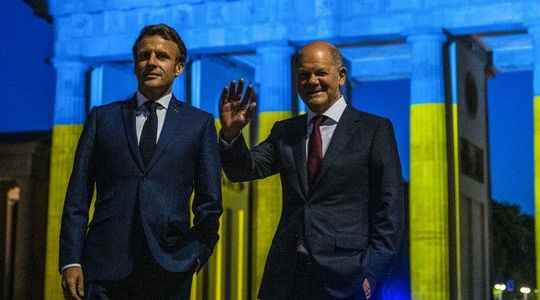On the one hand, Emmanuel Macron and Olaf Scholz try to speak into the handset. At the other end of the phone, Vladimir Putin is relaxing in a bloodbath. This week, the Polish weekly Wprost highlights the “compromises” of the German and French leaders, whose only objective would be to “save face for Putin”.
Unsubtle as it may be, this cover of the conservative Warsaw newspaper illustrates an increasingly widespread feeling in northern and eastern Europe: the Franco-German couple, by trying to spare the Kremlin and negotiate with Putin, would justify Russia’s brutal invasion of Ukraine. Worse, some accuse Paris and Berlin of pushing kyiv to cede land to Russia to end the war, which the Elysée has always refuted.
A fracture worse than at the time of the debt crisis
If the Franco-German maneuvers remain vague, European misunderstanding is very real. “A structural fault line is forming in Europe, between a camp led by the Baltic countries and Poland, and another led by France, Germany and Italy, observes Ricardo Borges de Castro, director deputy of the European Policy Center, a think tank based in Brussels.Europeans do not agree on the end goal of this war, which creates even greater divisions than between North and South at the time of the debt crisis, a fracture even more serious than at the start of the pandemic. Europe is facing an existential crisis.”
The Baltic countries and Poland are indeed the most vehement against the Franco-German couple: they reproach him for his inaction vis-à-vis Vladimir Putin during his twenty years in power, in particular after his annexation of Crimea in 2014, and his desire to maintain dialogue with the Kremlin in the midst of an invasion of Ukraine. Beyond Emmanuel Macron’s wish “to avoid humiliating Russia”, the whole Franco-German strategy is called into question.
May 28 marks a break in European unity around Ukraine: that day, Macron and Scholz spend long minutes on the telephone with the head of the Kremlin, in order to release the tons of cereals and fertilizers immobilized in Ukrainian ports. If Volodymyr Zelensky is, as always, warned of this exchange upstream, this is not the case for the European allies. The phone call goes very badly. Latvian Defense Minister Artis Pabriks speaks of “humiliation” on Twitter. “Call Putin for 80 minutes, isn’t it, to paraphrase Macron, brain death?, gets carried away by the very media-savvy Estonian MP Marko Mihkelson on Facebook. Macron and Scholz should hang up the phone and rush to Ukraine. I hope their strange behavior is not motivated by the fear of losing influence in a democratic Europe that would include Ukraine, but also Moldova and Georgia…”
Doubts about Europe’s strategic autonomy
The question of American influence in Europe forms the backdrop to these divisions. For five years, Emmanuel Macron has been campaigning for strategic autonomy for Europe, which would no longer need its unstable American big brother to defend itself. But the war in Ukraine has caused the Americans and NATO to come back in force on the Old Continent, much to the relief of the Baltics and Eastern Europeans. “It is logical that France and Germany want to maintain a degree of autonomy vis-à-vis the United States, but Emmanuel Macron wants to go further and advance his idea of sovereign Europe, underlines Ricardo Borges de Castro The French president should note, however, that at the moment he is not making any friends in Eastern Europe and the Baltics.”
In order to reconcile Europe, the Franco-German couple could start with a visit to kyiv. Almost all the Heads of State of Central and Eastern Europe have visited President Zelensky’s bedside, and the Western absence is beginning to weigh. Both Emmanuel Macron and Olaf Scholz say such a trip will happen as soon as they have “concrete solutions to bring” to Ukraine. One question remains, however: at that time, will they still be welcome there?
